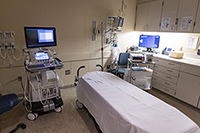Multidisciplinary team of specialists providing cutting-edge minimally invasive treatment of thyroid nodules
The UC Davis Center for Interventional Thyroidology is dedicated to providing innovative and state-of-the-art treatment for thyroid nodules. Our center is a collaboration between endocrine surgery and radiology. Our multidisciplinary team works together to provide expert care for these specialized procedures.
What does the UC Davis Center for Interventional Thyroidology do?
We are proud to offer radiofrequency ablation (RFA) for benign thyroid nodules, as well as ethanol ablation (EA) for cystic (fluid-filled) thyroid nodules. UC Davis was one of the first centers in California to offer RFA for thyroid nodules and has been successfully treating patients with this technology since 2021. We are committed to offering patients nonsurgical options for common thyroid issues including large thyroid nodules that cause discomfort or difficulty swallowing, as well as thyroid nodules that over-produce thyroid hormone (toxic adenomas). Our team also coordinates research on these techniques, investigating how safe and effective they are and how these procedures affect patients’ quality of life.
What is RFA?
 Radiofrequency ablation is performed in an outpatient procedure room Radiofrequency ablation is performed in an outpatient procedure room
|
|
RFA is a nonsurgical, outpatient treatment that is an alternative to surgery in some patients with thyroid nodules. RFA uses a needle-like electrode to deliver electrical energy into a thyroid nodule through the skin. This energy damages the cells inside the nodule, causing it to shrink in size over time. While the nodule will not completely go away, the goal is to reduce the size by 50-80% of its initial volume. This happens slowly over time and can take up to a year to see the full effect. |
What is the procedure like?
| Thyroid RFA is performed similarly to a biopsy, using an ultrasound to guide a needle into the nodule. The procedure usually lasts around 1 hour, and patients can go home the same day after a period of monitoring in the recovery room. Patients are awake during the procedure and local numbing medication is used for pain control. Most patients are able to go back to work 1-2 days after the procedure. |
|

Claire Graves, M.D. evaluates a thyroid nodule prior to ablation.
|
What is ethanol ablation?
|

Sima Naderi, M.D. performs radiofrequency ablation of a right thyroid nodule.
|
|
Thyroid nodules that are made up mostly of fluid, called “cystic nodules,” can be treated by removing the fluid with a needle, much like deflating a water balloon. Unfortunately, most cystic nodules will quickly refill with fluid. Ethanol ablation is a technique that uses alcohol to “irritate” the walls of the cyst so that scar tissue forms and prevents fluid from building back up inside the nodule. This procedure is typically performed in our clinic. |
Please contact us to set up an appointment with UC Davis Endocrine Surgery.

 Radiofrequency ablation is performed in an outpatient procedure room
Radiofrequency ablation is performed in an outpatient procedure room


